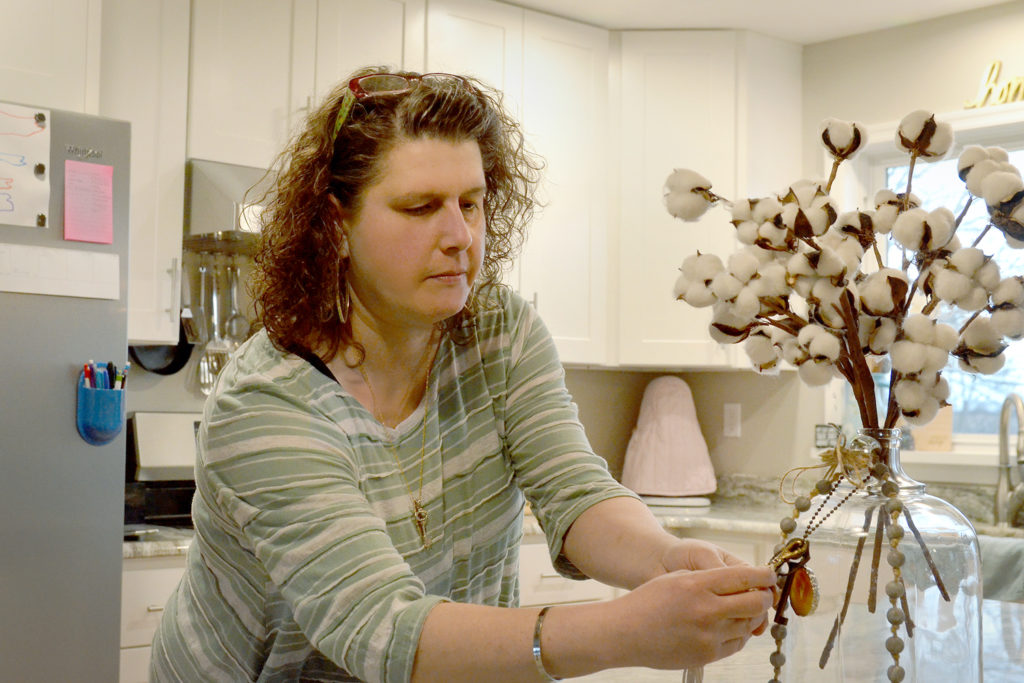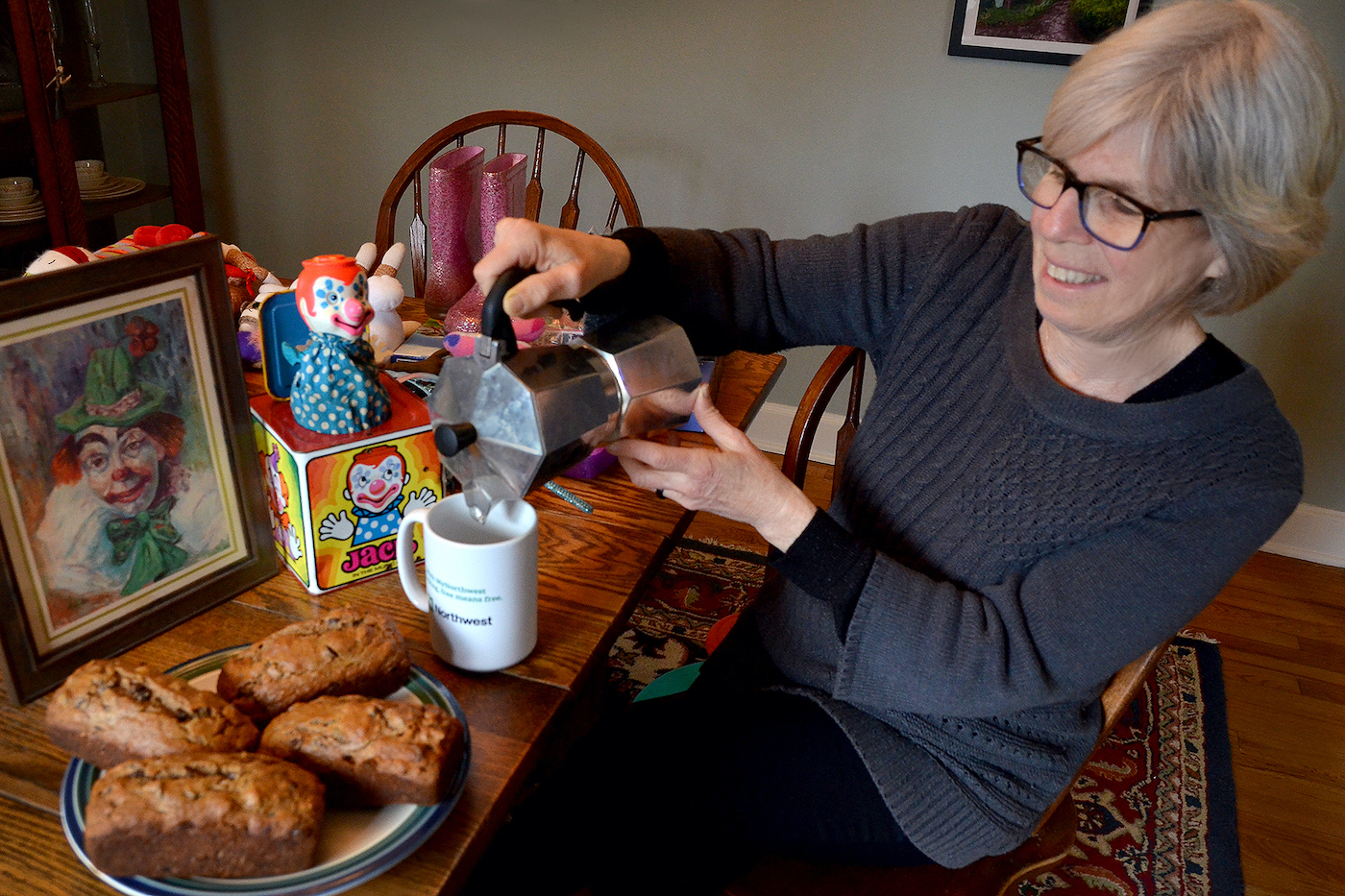When Amanda Becker recently threw a party to celebrate a milestone birthday, she overheard a few of her guests talking. As they mingled in a living room filled with décor Becker got for free from members of a Buy Nothing Facebook group, the guests were enjoying food cooked in a crockpot Becker borrowed from a different Buy Nothing member, using disposable silverware that came from yet another Buy Nothing member.
“I heard them telling my cousin, ‘Oh, we know Amanda through the Buy Nothing group.’ And suddenly I thought, ‘Oh my gosh, there must be at least half a dozen people here that I met through Buy Nothing,’” Becker says.
In many ways, Becker’s birthday party experience encapsulates the essence of the Buy Nothing Project, an international network of small online communities with the shared mission to “Give, receive, lend, share, and show gratitude in hyperlocal gift economies, where the true wealth is the connections between real neighbors.”
The organization was formed in 2013 in the state of Washington, where Melissa Wilson lived at the time. She was an active member of one of the original Buy Nothing groups and brought the concept to Centre County.
“We moved to State College in February of 2015, and when I saw that there wasn’t a local Buy Nothing group here, I requested to create one,” Wilson says.
Becker joined Wilson’s new group on Facebook and volunteered to serve as an administrator almost immediately, she says. Today, there are six State College groups, broken down geographically along elementary school attendance lines. Wilson is the administrator for the State College Houserville/Lemont group, while Becker is administrator for the State College Ferguson/Corl Street group. Both also provide backup administrator duties to other local groups.
Internationally, Buy Nothing has grown to 6,700 groups, with 5 million Buy Nothing users in 44 countries around the globe. All groups currently congregate via social media, particularly on Facebook, although the organization is in the process of rolling out a new app. Administrators are all volunteers who undergo official training and belong to their own administrator Facebook groups, where they can share ideas and troubleshoot.
Gifting, Sprouting & Simmering
Buy Nothing groups have some universal rules. For example, buying, selling, bartering, or trading are all no-no’s. Certain items, like prescription medications, weapons, or anything illegal, are off limits. Members can only belong to one Buy Nothing group at a time, and it has to be in their geographic area. Once you’ve arranged to accept an item, you are expected to pick it up when you say you will; three “no-shows” and you’re out of the group.
Members are also strongly encouraged to avoid using what Becker calls “sales-site speak.” That means Buy Nothing members should use complete sentences when posting or commenting, rather than common shorthand phrases like “ISO” (In Search Of), “Interested,” and “Next!”
“I like to say, ‘Talk to each other the way you would talk to your neighbors if you were hanging out in person,’” Becker says. “If someone offered you something, you wouldn’t yell, ‘Want!’ That’s not how you treat your neighbors.”

The Buy Nothing community has even developed its own vocabulary, according to Helen Dempsey, administrator of the State College Borough/Easterly Parkway Buy Nothing Group. For one thing, members use the word “gift” as a verb, as in, “I would like to gift this item that I can no longer use.”
In addition, Dempsey says, “We do a thing we call ‘sprouting.’ It’s really just what we call groups splitting into smaller groups.”
Sprouting happens whenever a Buy Nothing group begins to grow too large. Dempsey’s current group was formed about a year ago, sprouting off a Boalsburg/State College group.
“There are always sad feelings when a group splits and sprouts, because of the connections we’ve made with people in the group,” Dempsey says.
But Becker says these kinds of growing pains are necessary, in order to keep groups small enough for members to get to know each other. She says the ideal size for a group hovers at around 600 to 800 members, and she can tell a group is getting too large when the interactions start to become less personal—meaning less conversations and more “lightning gifting,” i.e., quickly gifting items to the first commenters to respond, rather than letting them “simmer,” another unique Buy Nothing term.
“Simmering” means allowing all members enough time to see and express interest in an item before selecting a recipient, whom “gifters” are encouraged to choose based on reasons other than someone being the first to reply. In order to avoid hard feelings when there is a highly coveted item being offered, Dempsey says members often will choose a name out of a hat or use a random number generator, but they are not obligated to explain how or why they made their selection.
To keep things interesting, administrators often come up with different kinds of themes, like “Wish Wednesdays,” “Tall-Ask Tuesdays,” or even “Thankful Thursdays,” in which users are encouraged to write “Gratitude Posts” expressing thanks for gifts they are particularly grateful to have received.
Intentional Gifting
“Giving from your own abundance is a key component of our group,” says Wilson. That means freely giving away items you already have, rather than using the group as a community bulletin board and telling users where they can buy an item they seek, she says.
While it is common to see posts for the kinds of items you might expect—clothing, toys, books, dishes, small appliances—there are a lot of unexpected gifts, too. Recent postings in the Houserville/Lemont group included things like bubble wrap, pothos plant cuttings, a frozen ham, a sofa, and partially filled bottles of shampoo. Almost every Buy Nothing user seems to have some kind of story about an unusual gift or experience.
“The strangest thing I ever gifted was a wishbone from a turkey,” Dempsey says. “I posted it on Buy Nothing and a woman wanted it for her mother. She said her mother always looked forward to the wishbone at Thanksgiving, but because of the pandemic they didn’t do Thanksgiving that year.”
Anne Cornell, a member of Dempsey’s group, says, “Probably the most memorable (to me, at least) Buy Nothing interaction I had was last September when my husband picked the last of our tomatoes and said he’d like to try fried green tomatoes. I told him it was traditional to coat them in corn meal, but I didn’t want to buy a bag of corn meal for a few green tomatoes. I laughingly told him that I might post [a request] on Buy Nothing. But I didn’t; that would be ridiculous! The very next morning, guess what appeared on Buy Nothing? A post that said, ‘Could someone use this 2+pound bag of corn meal?’ We had fried green tomatoes that night!”
Gifts are not just about material things. Acts of service—such as providing rides, moving furniture, or repairing zippers—are encouraged as well. It’s all part of the intentional gift economy Buy Nothing hopes to foster, and that Becker tries to model.
“I feel like feeding people is kind of my love language, so sometimes when I’m cooking for my family, I’ll make extra quarts of soup and I’ll gift it,” Becker says.
People have come to look forward to her soup offerings and they’re always a popular gift, she says. “That makes me feel good. So in a way, it’s a gift for me, too.”
Dempsey says, “This is the best thing I ever got on Buy Nothing: I got remarried a couple years ago and I requested some ring bearer pillows. And a woman said, ‘I don’t have any, but I love to sew and I would be happy to make you some.’ So she made me the most beautiful little ring bearer cushions. The next year, her son got married, and I gave the pillows back to her so he could use them. It was a perfect Buy Nothing experience.”
Connecting Neighbors
The soup, the pillows, and the acts of service are all examples of giving that go beyond simply wanting to pass along your junk to someone else as you declutter—although there’s nothing wrong with that, Becker is quick to point out. There are many other kinds of groups devoted to that kind of giving, including groups like Freecycle, and some people find those kinds of groups more appealing than Buy Nothing, she says.
“Some people really just want to get rid of or pick up something without getting involved,” Becker says. “That’s fine, I get that. But in Buy Nothing, we want people to talk to each other and get to know each other. … There are connections made and friendships formed. It’s not just about the stuff.”
Those connections were important to Becker when she moved from Boalsburg to Ferguson Township in 2020.
“I am very much an introvert, and I had gotten to know a lot of my neighbors [through Buy Nothing],” she says. “So when we decided to move, I started to panic. I said, ‘I can’t leave my Buy Nothing group!’ … But when I moved to Ferguson and joined the Buy Nothing group there, at least four people that I made connections with have become my actual real-life friends that I count on.”
Dempsey says the hyperlocal nature of Buy Nothing communities helps to replicate the feel of neighborhoods from a bygone era.
“It’s kind of like how in the olden days, you would go to your neighbor to borrow a cup of sugar. People don’t really do that so much anymore.”
Buy Nothing group members have been known to band together to help others outside of their online community as well. Recently, some have been actively collecting household items for Afghan refugees who are settling in Centre County. Wilson and Dempsey say their groups have also worked together to provide full Thanksgiving meals to families in need.
Julie Angstadt, director of the Hummingbird Applied Behavior Analysis Center for special needs children, says the Houserville/Lemont group went above and beyond to help the new center open last year, providing everything from snacks and games to shelving and desks.
“I was blown away by the generosity from our community,” she says.
Becker believes the State College groups are successfully fulfilling the Buy Nothing mission.
“The goal is to be hyperlocal about gifting in such a way that you get to know your neighbors. I think we accomplish that quite well here. State College really is a fine example of how it is supposed to work.”
Search “Buy Nothing” on Facebook to find your nearest Buy Nothing group. T&G
Karen Walker is a freelance writer in State College. She is a member of the State College Houserville/Lemont Buy Nothing group.




